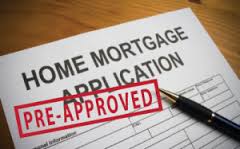Are you one of the many Millenial Americans dreaming of Buying Your First Home, but don’t quite feel ready? People delay homeownership for many reasons; some are unsure where to settle down, some have poor credit and fear they won’t get approved. As a Mortgage Loan Officer, I understand that every person has a different path to homeownership. If you foresee a home purchase in the next few years, now is the best time to start preparing, and I’m here to help!
where to settle down, some have poor credit and fear they won’t get approved. As a Mortgage Loan Officer, I understand that every person has a different path to homeownership. If you foresee a home purchase in the next few years, now is the best time to start preparing, and I’m here to help!
Just as with any project, your preparation will set the stage for your success. Think of your First Home Buying experience as your largest personal project yet!
Step One: Identify Your Goal
*Phew*, that one was easy! You’ve already completed step one, your goal is to purchase a home.
Step Two: Research
Have you made a choice about where you’d like to live? Researching towns is an important part of the process. You will want to evaluate average home prices for the neighborhood, consider potential property taxes, crime rates, and school ratings, and, more personally, determine the proximity to amenities that are important to you.
Step Three: Set a Timeline
Just like registering for a race inspires a runner to kick start their training, establishing a home buying timeline can help a prospective homebuyer kick start their preparation! Most importantly, be sure to set a realistic and achievable goal. If your aim is to purchase a home within two years, think about what you will need to do over the next 24 months to make that a reality. Are you allowing enough time to improve your credit score? Is there enough time and money each month to save for an ideal down payment?
Step Four: Take Action
With a prospective closing date in mind, do your best to stay on track toward your goal:
• If you haven’t yet, you should check your current credit score. It is wise to figure this out as soon as possible. Once you know, you will be able to see where you need to do work to improve it. Whether it is paying down credit cards, or enlisting the help of a credit repair service, your credit score is crucial to the mortgage application process. It is best to start preparing now!
this out as soon as possible. Once you know, you will be able to see where you need to do work to improve it. Whether it is paying down credit cards, or enlisting the help of a credit repair service, your credit score is crucial to the mortgage application process. It is best to start preparing now!
• It is wise to start saving what you can, even though there are loan products that offer little or no down payment options. Remember that there will be closing costs,  moving expenses, as well as repairs and furnishings to include in your budget. For a goal of collecting $20,000 over the next two years, you would need to save $833 each month. If you can’t find room in your budget to set that aside every month, consider extending your timeline a bit longer. If someone in your life will be gifting you funds to assist in the home purchase, try to discuss what that amount will be, so you can adjust your own savings plan accordingly.
moving expenses, as well as repairs and furnishings to include in your budget. For a goal of collecting $20,000 over the next two years, you would need to save $833 each month. If you can’t find room in your budget to set that aside every month, consider extending your timeline a bit longer. If someone in your life will be gifting you funds to assist in the home purchase, try to discuss what that amount will be, so you can adjust your own savings plan accordingly.
(If you plan to use gifted funds, you will need to have a gift letter documenting it; as your Mortgage Loan Officer I will be happy to assist you with preparing one.)
Step Five: Talk to your Mortgage Loan Officer
Following these preparatory steps, you will be in a good place when you are ready to start the official home buying process. When the time is right, reach out to Me to talk about your mortgage options and to take advantage of my FREE Jumpstart Mortgage Pre-Approval service.
start the official home buying process. When the time is right, reach out to Me to talk about your mortgage options and to take advantage of my FREE Jumpstart Mortgage Pre-Approval service.
 There is no such thing as a perfect neighborhood and every zip code has pros and cons. You might love a house, but if it’s in a troublesome area, it may have a negative impact on your day-to-day life, as well as the resale value of the home. Here are Five Neighborhood Red Flags to be aware of while checking out a potential new neighborhood.
There is no such thing as a perfect neighborhood and every zip code has pros and cons. You might love a house, but if it’s in a troublesome area, it may have a negative impact on your day-to-day life, as well as the resale value of the home. Here are Five Neighborhood Red Flags to be aware of while checking out a potential new neighborhood. something causing homeowners to leave. It could be something about the neighborhood itself, such as social issues like increased crime or falling school ratings, or gentrification of the area raising living costs and reducing affordable housing options. Alternatively, there could be many houses up for sale because of the homes themselves. If a neighborhood was developed all around the same time period and the homes appear very similar, it could be evidence that the houses were constructed by the same builder. Therefore, the homes will age at the same rate and may run into similar repair issues. Multiple homes for sale in this type of development could indicate they were built with poor quality. Think about this when wandering through a potential neighborhood!
something causing homeowners to leave. It could be something about the neighborhood itself, such as social issues like increased crime or falling school ratings, or gentrification of the area raising living costs and reducing affordable housing options. Alternatively, there could be many houses up for sale because of the homes themselves. If a neighborhood was developed all around the same time period and the homes appear very similar, it could be evidence that the houses were constructed by the same builder. Therefore, the homes will age at the same rate and may run into similar repair issues. Multiple homes for sale in this type of development could indicate they were built with poor quality. Think about this when wandering through a potential neighborhood! How would a buyer know if they are ready to buy a house?
How would a buyer know if they are ready to buy a house? officer at a local lender whom they trust. Some of the factors that are taken into consideration to be Pre-Approved are to always maintain a good credit score, income and asset verification and employment status.
officer at a local lender whom they trust. Some of the factors that are taken into consideration to be Pre-Approved are to always maintain a good credit score, income and asset verification and employment status. The agent and the loan officer should never pass any stress onto the buyer.
The agent and the loan officer should never pass any stress onto the buyer. 
 Many homebuyers, both first-timers and experienced movers, have wondered whether buying an existing home or building one to their specifications is a better fit for their needs. Here’s what you need to know:
Many homebuyers, both first-timers and experienced movers, have wondered whether buying an existing home or building one to their specifications is a better fit for their needs. Here’s what you need to know: Summer is here and you’ve finally moved into your First Home. It’s time to kick back and relax a bit. Cookouts are an awesome way to begin making great memories with family and friends in your New Home. Here are some tips to a successful cookout that will keep guests wanting to come back for more. Which ones work best for you?
Summer is here and you’ve finally moved into your First Home. It’s time to kick back and relax a bit. Cookouts are an awesome way to begin making great memories with family and friends in your New Home. Here are some tips to a successful cookout that will keep guests wanting to come back for more. Which ones work best for you? Lawn games are an essential addition to a successful cookout. They help to break the ice between guests who may not know each other, and can also create some great memories. Croquet, ring toss and badminton are fun games for all ages that can be played as teams or individually. They are also great to help pass the time while food is on the grill!
Lawn games are an essential addition to a successful cookout. They help to break the ice between guests who may not know each other, and can also create some great memories. Croquet, ring toss and badminton are fun games for all ages that can be played as teams or individually. They are also great to help pass the time while food is on the grill!

 looking for, what you need and what you can do without. Standing in the living room during an open house with your real estate agent isn’t the time to argue about wanting three bedrooms instead of four.
looking for, what you need and what you can do without. Standing in the living room during an open house with your real estate agent isn’t the time to argue about wanting three bedrooms instead of four. outstanding debt do you have? What monthly payment can you afford?
outstanding debt do you have? What monthly payment can you afford? going to want to know what your price range is, what neighborhoods you’re interested in, if you want to be close to schools, expressways, public transportation, etc. Know what you want and Get Pre-Approved!
going to want to know what your price range is, what neighborhoods you’re interested in, if you want to be close to schools, expressways, public transportation, etc. Know what you want and Get Pre-Approved!  away. There will be more houses, trust me.
away. There will be more houses, trust me. I have the belief that anyone that deserves to own a home should be able to do so. The American Dream is still attainable for those buyers who do their homework, establish a game plan and work hard to achieve that goal. I’m here to help.
I have the belief that anyone that deserves to own a home should be able to do so. The American Dream is still attainable for those buyers who do their homework, establish a game plan and work hard to achieve that goal. I’m here to help.
 Season. Sellers have finished staging their home for sale; the grass is green, flowers are blooming and curb appeal is at its peak. The Super Bowl is over; buyers are out of hibernation and doing their
Season. Sellers have finished staging their home for sale; the grass is green, flowers are blooming and curb appeal is at its peak. The Super Bowl is over; buyers are out of hibernation and doing their  scenario. But, please don’t think your opportunity has passed. Low interest rates make now a great time for millennials to be in the market for their First Home. Low financing costs make higher price points more affordable. Get
scenario. But, please don’t think your opportunity has passed. Low interest rates make now a great time for millennials to be in the market for their First Home. Low financing costs make higher price points more affordable. Get 
 Contract which will include the following information:
Contract which will include the following information: Now that your home is clean, some landscaping changes can make a huge difference as well. One great thing to do is add a fresh layer of mulch to your flowerbeds. At about $1.50 per cubic foot, this is a really inexpensive fix as well. Additionally, adding small gardens or window boxes will make the landscaping even better. Remember that when choosing flowers, the more color the better. If you want your house to draw people in, bright colors are a nice way to do that.
Now that your home is clean, some landscaping changes can make a huge difference as well. One great thing to do is add a fresh layer of mulch to your flowerbeds. At about $1.50 per cubic foot, this is a really inexpensive fix as well. Additionally, adding small gardens or window boxes will make the landscaping even better. Remember that when choosing flowers, the more color the better. If you want your house to draw people in, bright colors are a nice way to do that.
 Appeal? Does anything need repair or new paint? Does the roof look sturdy and intact? Chances are most things you notice will be cosmetic fixes, but if anything does jump out at you, you’ll be happy you took a look.
Appeal? Does anything need repair or new paint? Does the roof look sturdy and intact? Chances are most things you notice will be cosmetic fixes, but if anything does jump out at you, you’ll be happy you took a look.
You must be logged in to post a comment.